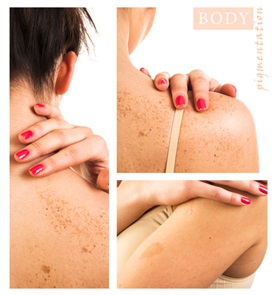Hyperpigmentation Treatments
Hyperpigmentation itself, is not usually threatening to a person's health. It can however sometimes be a symptom of an underlying illness or disease, and the ramifications can cause an individual to have anxiety or depression.
All ethnic groups and both males and females can be affected by the condition. This situation is triggered by melanocyte cells that are overactive, as these cells are responsible for the production of melanin, which gives your skin its color.
Success in reversing the condition can typically be accomplished by a thorough technique in treating the situation.
The color of the skin is triggered by the melanin cells. However in certain individuals overproduction of melanin triggers portions of the skin to end up being hyper pigmented resulting in freckles and dark spots.
This can be the result of too much sun, skin trauma, an immune system that is not functioning properly, or medication that can trigger the skin to be over delicate. Treatment is normally sought for cosmetic reasons instead of medical ones.
Hyperpigmentation can be found in three categories
1. Melasma is brought on by pregnancy as a result of imbalances of the hormonal agents of the thyroid gland.
2. PIH (Post Inflammatory Hyperpigmentation) which is caused by skin injury such as acne.
3. Lentigines, likewise known as liver or age spots, that happens from UV exposure and is rather typical in older people.
Treatment of hyperpigmentation can happen by several different methods, depending upon the intensity of the condition and its type.
Treating Hyperpigmentation
Topical Treatments and Creams
Topical creams consisting of alpha hydroxyl acids or retinoids is one possible treatment for hyperpigmentation. With this technique the top layer of the skin is exfoliated. These are a few of the active ingredients used:
* Kojic Acid which comes from fungi of different types
* Mandelic Acid which is derived from almonds
* Azelaic Acid which is a typical treatment for acne
* Mulberry Root extract
* Lemon balm, peppermint leaf and lots of other plant based components
Professional Treatments
If topical treatments are not effective it is a great idea to consult a skin doctor for the following treatments:
* Intense Pulsed Light Therapy
* Laser Resurfacing of the Skin
* Skin Peels
* Dermabrasion and Microdermabrasion
These types of hyperpigmentation treatments are popular and can only be performed by skilled professionals.
Natural Home Remedies
Treatments you can do at home consist of active ingredients that are natural such as lemon juice, cucumber, Aloe Vera, yoghurt, tomatoes and other natural ingredients that can lighten skin.
Mixes of different treatments can be more efficient than simply one treatment. Many times the application of a topical lotion or cream works well after a professional treatment.

